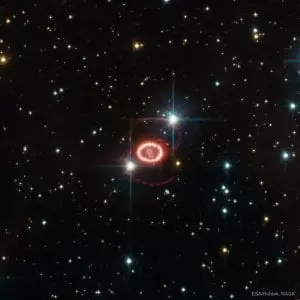In this twelfth installment of our series, we continue to critique the book, “Dinosaur Blood and the Age of the Earth,” by Fazale Rana (better known as Fuz Rana), an old-earth creationist and a prominent member of the Reasons to Believe organization headed by Hugh Ross. This article critiques Rana’s Appendix A, “A Biblical Case for an Old Earth,” and Appendix B, “The Creation-Evolution Controversy in Jurassic World”—pages 77-86. (Previous articles of this series can be found here: Part 1, Part 2, Part 3, Part 4, Part 5A, Part 5B, Part 5C, Part 6, Part 6B, Part 7, Part 8.)
The day-age view is skeptical of aspects of the evolutionary paradigm. Even though the day-age approach regards the fossil record as a real sampling of life’s history it treats that history as divinely orchestrated, with the Creator repeatedly intervening to create new taxa.—pg. 78, [italics supplied]
I would contend that the coherent, precisely coordinated genetic changes needed to generate one biological system from another bespeaks not undirected evolutionary mechanisms, but a Creator’s handiwork, as the explanation for life’s history.—pg. 86, [italics supplied]
“A Biblical Case for an Old Earth?”…or a Rejection of the Biblical View?

Does Fuz Rana’s old earth creationism arise organically out of Scripture and legitimate science, or is it an artificial construct superimposed upon Scripture? And a mere partisan interpretation of scientific data?
There is so much confusion in Fuz Rana’s Appendix A and Appendix B that I found it difficult to know where to start, so I decided to start with what I regard as the most significant point. In Appendix A of “Dinosaur Blood and the Age of the Earth,” we learn something about Fuz Rana that he did not tell us in the main body of his work. Rana saved the best for last: Fuz Rana admits to being an evolutionist!
More precisely, Fuz Rana believes in Theistic Evolution.
But not to worry, dear orthodox Evangelical reader, do not fret: Man, according to Rana, is unique and not part of the Theistic evolutionary process that molded all of the rest of the biological world. With this rescuing device, we do not have to worry that Rana’s thesis might undermine the Gospel!

Whew!—that was really close…like just barely escaping being run over by a train! Now I can rest my head on my pillow tonight secure in the knowledge that no doctrine subversive of Scripture is to be found in Rana’s thesis! Now, I can put Rana’s book on my library shelf right up there with Augustine, Luther and Calvin. Aren’t they just like peas in a pod?
“I’m not a biblical scholar.”
As if anticipating justifiable criticisms of his stance, Rana makes this disclaimer:
I urge the reader to keep in mind that my training is in biochemistry. I’m not a biblical scholar, nor a theologian.—pg. 77.
I will, indeed, keep that in mind!
Actually, we could not have helped but to notice this crystal clear fact, even if Rana had not given us this advance caveat. Nor, apparently, is Rana’s training in logic. Both of these verities will become embarrassingly obvious as Rana proceeds. Despite this commendable self-awareness and admission of incompetence at this attempt at biblical theology, Rana is very certain, nevertheless, that his version of biblical theology is the correct one. This is all based, not upon Scripture, but upon Rana’s deference to other “authorities,” chief of which, no doubt, is his mentor, Hugh Ross, the head of the Reasons to Believe organization.
Rana continues:
But I have read countless works of people who are [biblical scholars and theologians]. Therefore, what I present reflects their influence on my thinking.—pg. 77
Rana goes on to give us a list of the biblical scholars and theologians who have had an influence on his thinking, including Don Stoner, David Snoke, and Rodney Whitefield. Moses, however, apparently does not qualify for the list! After all, who needs Moses when we have Hugh Ross?
I hope Dr. Rana will not find it too unreasonable of me if I’d prefer to place my confidence in the Word of God instead, and if I do not lean upon the arm of flesh. I proclaim with the Reformers: “Sola Scriptura.”
Scripture is its own interpreter if we will but bow to its authority. This is a critical lesson that, in my opinion, OEC’s (old earth creationists), including Fuz Rana, have apparently not learned. Not surprisingly, Rana cites the authority of his boss at the Reasons to Believe organization, Hugh Ross, and Ross’ book, “A Matter of Days,” which I critiqued briefly in the very first article of this series.
Polemical Rescuing Devices
Rana states:
Instead of interpreting Genesis 1 in a way that conflicts with science, the day-age view provides a pathway that leads to harmony between science and Christianity.—pg. 77
Just substitute the phrase “polemical rescuing device” in place of the word “pathway” in Rana’s statement above and you will get his point. What Rana means by “science” here is the evolutionary doctrine of secular, atheistic academia, and the deep time speculations which are absolutely essential to evolutionary dogma.
This basically constitutes an admission on Rana’s part that he is tailoring his interpretation of Scripture to harmonize biblical doctrine with evolutionary dogma. Rana will throw the atheist evolutionists the crumbs of animal and plant evolution as long as we biblical theists get to keep the real meat of direct Divine human creation on the table!
Conflict Between Science and Christianity?

In response to Fuz Rana’s statements quoted above, it needs to be asserted that Christianity (i.e., the Bible, including the Old Testament) already is in harmony with science, including the Biblical testimony of a universe which is about 6,000 years old. The word “science,” after all, simply means knowledge. The perceived disharmony arises from the misguided acceptance of the pseudo-science of deep time.
This perceived disharmony also arises out of a misplaced trust in institutional science’s interpretation of radiometric dating “results,” (See here, and here, for example), and a naïve and presumptuous belief that we know all there is to know about astrophysics and the speed of light (see here, here, here, and here, and for an in-depth foray into the cutting-edge of physics see David Lapoint’s videos on Primer Fields here, here, and here).
There was a time (and still should be) when biblical theology was regarded as “the Queen of the Sciences.” Fuz Rana has his epistemology upside down!
In Rana’s thesis, there is a conflict between science and Christianity. And Rana intends to remedy that Scriptural defect with a day-age deep-time hypothesis superimposed upon Scripture, and a concession to evolutionary dogma regarding all species of the biological world—except for Man.
Frankly, exempting humanity from the process sounds conveniently arbitrary to me, polemics without scientific or Scriptural substance, and I can think of no valid reason why any of the atheist evolutionists he is trying to persuade of the Gospel should see it any other way.
Rana under the microscope
Let us scrutinize a few of Rana’s remarks above one clause at a time:
The day-age view is skeptical of aspects of the evolutionary paradigm.
Did you catch that, dear reader? Rana’s day-age view is not skeptical of evolution, per se, but only certain aspects of it. Specifically, Rana’s brand of OEC rejects human evolution and, apparently, only human evolution. And Rana rejects the chance/random schema upon which Darwinian evolution is based.
Other than that, Rana buys into the entire evolutionary paradigm:
- Molecules to living protozoan evolution
- Protozoan to multi-celled organism evolution
- Fish to amphibian evolution
- Amphibian to reptile evolution
- Reptile to mammal and bird evolution
- Primitive mammals to ape evolution actually occurred
—all this is OK in Rana’s OEC paradigm. Let’s just exempt human evolution from the equation!
“to generate one biological system from another…”
Rana is proclaiming the doctrine of Theistic Evolution. From Rana’s point of view, the evolutionists’ interpretation of the fossil record is correct. Fuz Rana believes evolution happened, you see, because God did the evolving. And, let’s stop just short of human evolution so those unscientific, literalist, young earth creationists can be appeased and go along with the program!
Dear reader, do you see where the old earth creationist paradigm inevitably leads? It leads to virtually total capitulation to the atheistic view of the world. I see no compelling reason, once we accept Fuz Rana’s premises, why we shouldn’t just throw the entire Bible in the trash can. And yet Fuz Rana accuses young earth creationists of discrediting the Gospel!
Really?
the fossil record a real sampling of life’s history….
I find this to be truly subversive, disingenuous language. Why is Rana so cryptic here? This is obviously very carefully worded. Why can’t Rana just bring himself to talk directly here? Rana obviously means “life’s evolutionary history over hundreds of millions of years just as the atheists proclaim,” but he leaves out the word “evolutionary” because he knows the word “evolutionary” will evoke immediate resistance from mainstream Evangelicals. Yet he plants the idea into the reader’s mind.
When Rana speaks of “the fossil record,” he is speaking of the fossil record as hypothesized by atheistic, institutional science, including molecules to man evolution –ooops!, sorry!—molecules to ape evolution.
One Day with God is as a Billion Years?

Rana states:
There are very good biblical reasons to think that the creation days refer to long, finite periods of time—epochs—not calendar days. –pg. 77
and
The day-age view is just as much a literal reading of the Genesis 1 creation account as is the YEC interpretation.—pg. 78
Did I miss something? Is Rana actually saying that calling a time span of up to a billion years a “day” is just as much of a literal reading of Genesis as calling 24 hours a day? Apparently so! I am beginning to take Dr. Rana very seriously indeed when he says he is not a theologian. (Shouldn’t all Christians who believe the Bible is the Word of God be theologians?)
Several signifiers in the Genesis 1 account indicate that the best reading of yom in Genesis 1 is a long but finite period of time. For example, the first day of creation describes the genesis of the day-night cycle. That is, the first calendar day was created on the first creation day. This scenario strongly implies that the creation days must be epochs, not 24-hour periods.—pg. 78-79
Did I miss something again? How does the fact that the first calendar day occurred on the first creation day indicate that that day spoken of is an epoch of time? There is a severe breakdown of logic here.
Don’t you have to presuppose that a day is an age first to come to this conclusion here? Rana is falling prey to a tautology here, that is, circular reasoning. Is this not precisely the point of contention that has to be proven first? Has Rana plumbed the depths of some metaphysical syllogism that your poor present writer is just ill-equipped to fathom? I seem to be missing things all over the place. Or maybe there’s just something missing in Rana’s “logic” and in his theology?
On page 85, in Appendix B, Rana speaks of “the sudden, saltational changes routinely observed in the fossil record.” “Saltational changes” is not creation ex nihilo.
“Saltation” refers to jumps or leaps of evolution. Rana is clear that he is talking about “changes” in living organisms from one kind of organism to another, that is, Darwin’s tree of life, and that he is talking about Theistic Evolution. Moreover, he is borrowing a page from the Punctuated Equilibria of secular evolutionists Stephen J. Gould and Niles Eldredge, et al, with the talk about saltational, evolutionary changes.
Finally, the omission of the phrase, “And there was evening and there was morning…” from the description of the seventh day suggests that the creation days are epochs not calendar days. “Evening and morning” are used to connote the conclusion of each of the first six creation days. The fact that this expression is not used for the seventh day implies that this creation day has not ended.—pg. 79
This is an argument from silence, and is logically invalid. Where there is silence, one can pour in any meaning and content one wants. The meaning Rana inserts into the scenario is wholesale speculation with zero substance to it. Rana is going to have to do a lot better than “suggests” or “implies” here.
Even if we grant Rana the legitimacy of his suggestion here, the obvious rejoinder does not seem to occur to Rana, namely, that the seventh day is distinguished from the first six days, that the focus of the first six days is upon God’s creative acts, and that the seventh day was not a creation day but a rest day. We could say that the seventh day is an epoch in the sense that God’s rest from creation is, indeed, ongoing and perpetual. This distinction of the seventh day from the first six only strengthens the emphasis upon the fact that the first six days were ordinary, 24 hour days. But this whole argument is based upon silence and is, therefore, devoid of substance.
In the end, Rana’s thesis is just a baptized (and barely-altered) version of the secular, atheist doctrine of “punctuated equilibria.” Rana’s thesis is a house built on the sand.








Mr. Shipley,
I have been reading everything you put out here, and I must say, AMEN!!! Thank you for all your efforts and passion and COMMON SENSE. Please keep up the good work. In fact, if you could put out an article every day, I would appreciate it. Ha, ha. God bless and have a great weekend.
Hello, Sam. Thanks for the kind words. Wow! An article every day. Now that is something to aspire to! Actually, I have learned a valuable lesson: quality trumps quantity. I wish every Christian writer would learn this lesson. Better to sit on an article and meditate on it for a while for some improvement, rather than to try to put one out there quickly just to usher in another one of equally inferior quality! There are always improvements that can be made no matter how many times you review what you’ve done. There are times when I have read up to four whole books just to insure the accuracy of a paragraph or a sentence. I don’t like loose ends. A serious writer can’t cut corners. I have made the point before that the difference between an amateur and a professional is precisely the attention to detail. This is the difference between crude and refined, between coarse and smooth. It is also the difference between powerful and impotent. Since I deem this to be service to the Lord, I cannot countenance anything less than absolute diligence on my own part.
Ross has implied that he believes in a modified form of evolution for the “pre-Adamite race”, so it would not be surprising if Julian Henry Huxley — I mean, Rana, Ross’ bulldog — presents the same view.
A couple of links that support what you’re saying. First, aside from the possible argument from silence about Day Seven being ongoing (which I think proponents of that view are doing worse than an argument from silence, they are doing eisegesis; the rest of the Bible opposes theis view), see Is the Seventh Day 24-Hours Long?
For the section about the days of Creation, Rana could have done a bit of research, even from the ministries he obviously detests, and seen that there are other words God could have used to indicate long periods of time, see How long were the days of Genesis 1?
Hope y’all find these useful.
Thanks, Bob. Great references. I find the meaning of the days of Genesis 1 so clear that, to my thinking, you simply have to have an opposite agenda not to get it. Hugh Ross said in “A Matter of Days” that he believes the creation of Adam ocurred about 50,000 years ago. I don’t think he defended that assertion with argument. Ross clearly places interpretations of scientific data above Scripture (while professing otherwise), so I’m rather sure Ross got that idea from something or other that he read in some science journal somewhere. It certainly did not come from Scripture. The day-age view of Rana and Ross, et al, is certainly eisegesis as you haved noted.
It seems to me as though you have interpreted the work of Fazale Rana and Hugh Ross and some Twisted way. I do not believe you properly capture or interpret their ideas correctly at all. It seems to me like you have your own young Earth agenda and Bible theology that you want to push.
That’s rather vague, Rick. Would you care to give some substance to this assertion and give some specifics?